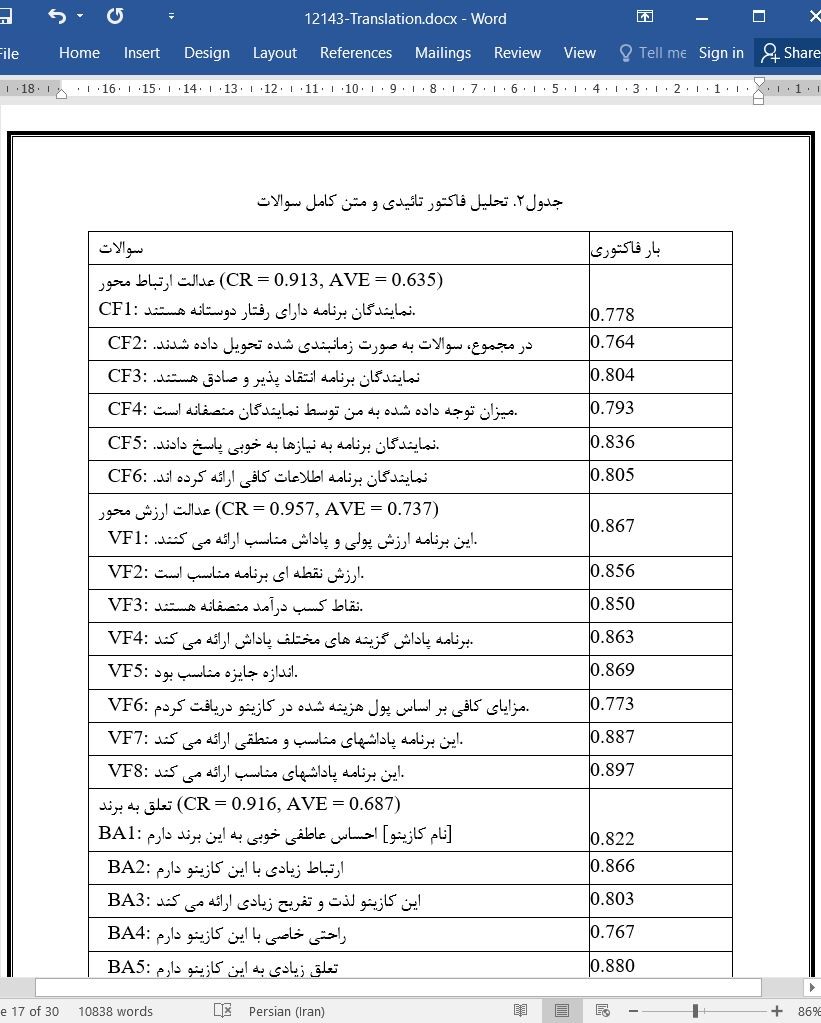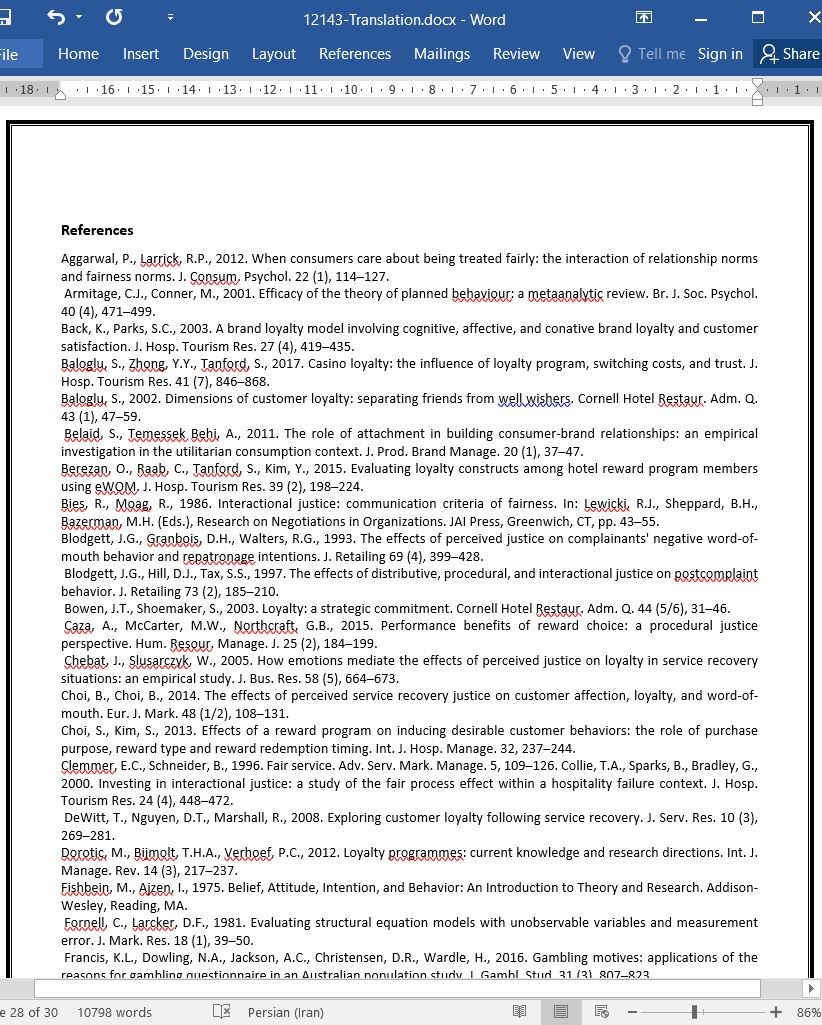
ایجاد وفاداری از طریق برنامه های پاداش
چکیده
برداشت عدالت که ریشه گرفته از نظریه عدالت است به عنوان یک عامل کلیدی برای افزایش کارایی برنامه های ایجاد وفاداری مورد ارزیابی قرار می گیرد. این تحقیق با استفاده از نمونه ای برگرفته از اعضای برنامه پاداش کازینو، به بررسی نقش های تاثیر گذار تعلق به برند و تمایل وفاداری بین برداشت عدالت و نتایج وفاداری پرداخته است. این تحقیق سهم خرید را به عنوان نتیجه فرآیند وفاداری معرفی کرده است. این نتایج دلالت بر این دارند که عدالت ارتباطی و ارزش محور تاثیر قابل توجهی بر تعلق به برند و تمایل وفاداری دارد. به علاوه، تعلق به برند تاثیر قویتری بر سهم خرید در مقایسه با تمایل وفاداری دارد. این تحقیق، راهنمای ساختار بندی موثر و وفاداری رقابت در برنامه های پاداش در بازار می باشد. نتایج بدست آمده بیان می کنند که از طریق درک عدالت، بازارها می توانند حس تعلق به برند را ایجاد کنند و سهم خرید را از طریق افزایش سود بالا ببرند.
1. مقدمه
ساخت رابطه مثبت با مشتریان برای مدیریت موثر استراتژی های بازاریابی به عنوان ابزاری برای تامین نیازهای مشتری و وفاداری مشتری ضروری می باشد. در حالی که حفظ مشتری یک عامل اساسی برای افزایش سود شرکت است، اما وفاداری با هدف ایجاد رابطه ماندگار بین شرکت ها و مشتریان شکل می گیرد. یکی از مهم ترین روشهای افزایش وفاداری، برنامه برنامه است. برنامه های پاداش برای برنامه های تفریحی اهمیت بیشتری دارند که در آنها اعضا بر اساس فعالیت های انجام شده پاداش دریافت می کنند و آن را مستقیم به سود تبدیل می کنند.
5.4 محدودیت ها، تحقیقات آینده و نتیجه گیری ها
اگرچه در این تحقیق اطلاعات با ارزش و معناداری ارائه شده است، اما نحدودیت هایی نیز وجود دارد. نتایج تحقیق بر گرفته از یک برنامه پاداش در کازینوها می باشند، بنابراین قابلیت تعمیم بخشی نتایج مخدود است. با این وجود، حمعیت آماری زیاد می باشند و شامل تمام اعضای برنامه پاداش کازینوهای مقصد لاس وگاس می باشند. تحقیقات آینده نیز برای ادغام اعضای سایر موسسات تفریحی در ارائه نتایج تحقیق پیشنهاد می شوند. برای روش گردآوری اطلاعات نیز محقق فقط اطلاعات به دست آمده از آدرس های ایمیب معتبر را در نظر گرفته است که این کار باعث ایجاد جهت گرایی در تحقیق می شود. یکی دیگر از محدودیت های تحقیق این است که متمر کز بر شاخص های خود سنجی است. بنابراین، نتایج بدست آمده از اطلاعات خود گزارشی نمی توانند به درستی منعکس کننده فرآیند پیچیده ایجاد وفادرای باشند. انجام تحقیقات بیشتر برای استفاده از داده های واقعی توسط کارت های بازیدر برنامه مربوط به کازینو ها پیشنهاد می شود. ما به اطلاعات مربوط به این تحقیق دسترسی نداریم.
Abstract
Grounded in the Theory of Justice, perception of fairness is evaluated as a key element to enhance the effectiveness of loyalty programs. Using a robust sample of casino reward program members, the research examines the mediating roles of brand attachment and loyalty intention between perceptions of fairness and loyalty outcomes. The study introduces share-of-wallet as a critical outcome of the loyalty process. The results indicate that communication-based and value-based fairness significantly influence brand attachment and loyalty intention. Moreover, brand attachment has a stronger impact on share-of-wallet than loyalty intention does. The research yields guidance for hospitality marketers to structure effective and competitive loyalty programs. The results add new insight into loyalty processes and extend the hospitality loyalty literature by suggesting brand attachment as a primary indicator for loyalty outcomes. The findings suggest that through perceived fairness, marketers can build brand attachment and increase share of wallet, thereby increasing profitability.
1. Introduction
To construct a positive relationship with customers, it is crucial for businesses to manage marketing strategies effectively as a means to satisfy customer needs and build customer loyalty. While customer retention is a fundamental element to enhance the firms’ profitability, loyalty is highlighted with the aim of establishing a lifetime relationship between the firms and their customers. One of the foremost methods for cultivating loyalty is the reward program. Reward programs are especially important for casinos, where members are rewarded based on their gaming activity, which translates directly into casino profitability.
5.4. Limitations, future research, and conclusion
Although the study brings valuable and meaningful insights, it has some limitations. The research findings were derived from a single casino reward program; therefore, the generalizability of the results may be limited. Nonetheless, the sample was large and comprised actual reward program members from a Las Vegas destination casino. Future research is recommended to embrace the members from other casinos to strengthen the study findings. For the data collection approach, the research only included those who have valid email addresses, which could introduce bias into the sample. Another limitation of the research is that the survey relied on self-report measures. Thus, the findings derived from self-reported data may not correctly reflect the complex loyalty process. Research is suggested to incorporate actual casino spending data tracked through the player cards of the casino loyalty program. We were not given access to that data for the current research.
چکیده
1. مقدمه
2. مروری بر ادبیات
2.1 نظریه عدالت
2.2 درک عدالت و برنامه های پاداش
2.3 عوامل مرتبط با وفاداری
2.4 نتایج وفاداری
3. روش تحقیق
3.1 نمونه ها
3.2 اندازه گیری ها
3.3 تحلیل داده ها
4. نتایج
4.1 مدل اندازه گیری، پایایی و اعتبار
4.2 مدل ساختاری و بررسی فرضیه ها
4.3 تعلق به برند و تمایل وفاداری به عنوان فاکتور تعدیلی
5. بحث
5.1 بحث در مورد متغیرهای مدل
5.2 کاربردهای تئوری
5.3 کاربردهای تجربی
5.4 محدودیت ها، تحقیقات آینده و نتیجه گیری ها
منابع
ABSTRACT
1. Introduction
2. Literature review
2.1. Theory of justice
2.2. Perceptions of fairness and reward programs
2.3. Loyalty antecedents
2.4. Loyalty outcomes
3. Methodology
3.1. Sample
3.2. Measurement
3.3. Data analysis
4. Results
4.1. Measurement model, reliability, and validity
4.2. Structural model and hypothesis testing
4.3. Brand attachment and loyalty intention as mediators
5. Discussion
5.1. Discussion of model variables
5.2. Theoretical implications
5.3. Practical implications
5.4. Limitations, future research, and conclusion
References
- ترجمه فارسی مقاله با فرمت ورد (word) با قابلیت ویرایش، بدون آرم سایت ای ترجمه
- ترجمه فارسی مقاله با فرمت pdf، بدون آرم سایت ای ترجمه



